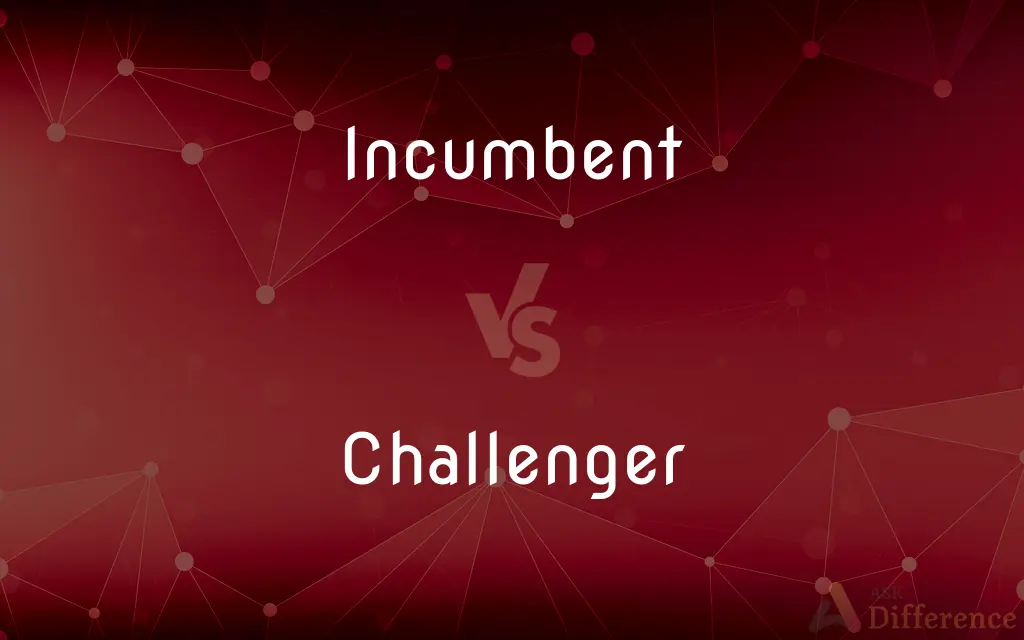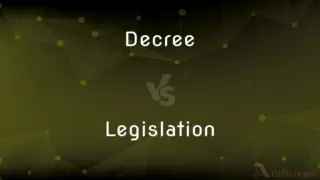Incumbent vs. Challenger — What's the Difference?
By Tayyaba Rehman & Fiza Rafique — Published on September 22, 2023
An Incumbent is the current holder of an office or position, while a Challenger is someone who is trying to unseat the Incumbent in an election or contest.

Difference Between Incumbent and Challenger
Table of Contents
ADVERTISEMENT
Key Differences
The term Incumbent generally refers to the individual currently holding a particular office or position, particularly in politics. They have the advantage of experience and perhaps even a track record that they can present to voters or selectors. A Challenger, on the other hand, is someone who contests for that same position, attempting to unseat the Incumbent. Challengers usually present themselves as a fresh alternative to the current leadership.
Incumbents often have the benefit of name recognition and an established network, as they've been in the position before. This can lead to advantages in fundraising and public support. Conversely, Challengers have to work harder to make themselves known, but their newness can also be an asset, especially if the public is dissatisfied with the current state of affairs.
While an Incumbent can rely on their existing relationships and record, they also have the disadvantage of being held accountable for any past actions or decisions. A Challenger, who doesn't have a track record in the same capacity, can focus more on future plans and promises, although they may have to contend with skepticism due to their lack of experience.
In the corporate world, an Incumbent can refer to a dominant company or technology, whereas a Challenger refers to newer entrants trying to disrupt the market. Here again, the Incumbent usually has the benefit of customer loyalty and economies of scale, whereas a Challenger may offer innovation and flexibility.
Comparison Chart
Status
Current Holder
Contestant
ADVERTISEMENT
Experience
More Experienced
Generally Less Experienced
Recognition
Higher
Lower
Accountability
Held to Past Record
Focus on Future Plans
Advantages
Name recognition, networks
Fresh perspective
Compare with Definitions
Incumbent
Current Holder: "The Incumbent is the existing officeholder."
The Incumbent mayor is running for re-election.
Challenger
Contestant: "The Challenger aims to unseat the Incumbent."
The Challenger put up a strong campaign.
Incumbent
Experienced: "The Incumbent has firsthand experience in the role."
The Incumbent CEO understands the company's culture.
Challenger
Promising: "The Challenger focuses on future plans and what they aim to change."
The Challenger vowed to reform healthcare.
Incumbent
Accountable: "The Incumbent is responsible for past actions and decisions."
The Incumbent government faced criticism for its policies.
Challenger
Lesser-known: "The Challenger often has lower name recognition."
The Challenger is still unknown to many voters.
Incumbent
Established: "The Incumbent often has established networks and resources."
The Incumbent president had strong party backing.
Challenger
Newcomer: "The Challenger brings a fresh perspective to the role."
The Challenger promised innovative solutions.
Incumbent
Recognizable: "The Incumbent usually has higher name recognition."
The Incumbent senator is a familiar face to the voters.
Challenger
Disruptive: "The Challenger seeks to disrupt the current order."
The Challenger in the tech industry introduced a groundbreaking product.
Incumbent
Imposed as an obligation or duty; obligatory
Felt it was incumbent on us all to help.
Challenger
One that challenges
A challenger of established authority.
Incumbent
Lying, leaning, or resting on something else
Incumbent rock strata.
Challenger
(Sports) One who competes against the holder of a title or championship, as in boxing.
Incumbent
Currently holding a specified office
The incumbent mayor.
Challenger
One who challenges; especially, one who plays against the current champion of a game or contest in hopes of winning and becoming the new champion.
The champion hopes to defeat his new challenger in the game to remain undefeated.
One child stood as king of the hill, and tried to withstand the pushes and shoves of his challengers.
Incumbent
A person who holds an office or ecclesiastical benefice
The incumbent was reelected to another term.
Challenger
One who challenges.
Incumbent
(Used with "on" or "upon") Imposed on someone as an obligation, especially due to one's office.
Proper behavior is incumbent on all holders of positions of trust.
Challenger
The contestant you hope to defeat;
He had respect for his rivals
He wanted to know what the competition was doing
Incumbent
Lying; resting; reclining; recumbent.
Incumbent
Prevalent, prevailing, predominant.
Incumbent
Resting on something else; in botany, said of anthers when lying on the inner side of the filament, or of cotyledons when the radicle lies against the back of one of them
Incumbent
(zoology) Bent downwards so that the ends touch, or rest on, something else.
The incumbent toe of a bird
Incumbent
Being the current holder of an office or a title.
If the incumbent senator dies, he is replaced by a person appointed by the governor.
Incumbent
The current holder of an office, such as ecclesiastical benefice or an elected office.
Incumbent
(business) A holder of a position as supplier to a market or market segment that allows the holder to earn above-normal profits.
Incumbent
Lying; resting; reclining; recumbent; superimposed; superincumbent.
Two incumbent figures, gracefully leaning upon it.
To move the incumbent load they try.
Incumbent
Lying, resting, or imposed, as a duty or obligation; obligatory; always with on or upon.
All men, truly zealous, will perform those good works that are incumbent on all Christians.
Incumbent
Leaning or resting; - said of anthers when lying on the inner side of the filament, or of cotyledons when the radicle lies against the back of one of them.
Incumbent
Bent downwards so that the ends touch, or rest on, something else; as, the incumbent toe of a bird.
Incumbent
A person who is in present possession of a benefice or of any office.
The incumbent lieth at the mercy of his patron.
Incumbent
The official who holds an office
Incumbent
Lying or leaning on something else;
An incumbent geological formation
Incumbent
Currently holding an office;
The incumbent governor
Common Curiosities
What is an Incumbent?
An Incumbent is the current holder of a specific office or position.
Do Incumbents usually have an advantage?
Generally, Incumbents have the advantage of experience and name recognition.
What is a Challenger?
A Challenger is someone attempting to unseat the Incumbent.
Is an Incumbent always a politician?
No, the term Incumbent can apply to any current holder of a position, including in business.
How does the public perceive Challengers?
Challengers may be viewed as fresh alternatives but may face skepticism due to lack of experience.
What are the advantages for a Challenger?
Challengers often bring fresh perspectives and can capitalize on any public dissatisfaction.
Do Challengers usually have a harder time fundraising?
Typically, yes, unless there is significant public dissatisfaction with the Incumbent.
Can an Incumbent lose the advantage?
Yes, particularly if they have a poor track record or face a strong Challenger.
Can a Challenger be an Incumbent in a different role?
Yes, a Challenger in one race could be the Incumbent in another.
Is it easier for an Incumbent to raise funds?
Often yes, due to their existing networks and recognition.
How does the public perceive Incumbents?
Perceptions can vary but Incumbents often benefit from being well-known.
Who usually endorses the Challenger?
Those seeking change are more likely to endorse the Challenger.
Can a Challenger become an Incumbent?
Yes, if the Challenger wins, they become the new Incumbent.
Is being a Challenger risky?
It can be, given the advantages usually held by the Incumbent.
Who usually endorses the Incumbent?
Usually party loyalists, and sometimes organizations or unions, support the Incumbent.
Share Your Discovery

Previous Comparison
Creationism vs. Evolutionism
Next Comparison
Decree vs. LegislationAuthor Spotlight
Written by
Tayyaba RehmanTayyaba Rehman is a distinguished writer, currently serving as a primary contributor to askdifference.com. As a researcher in semantics and etymology, Tayyaba's passion for the complexity of languages and their distinctions has found a perfect home on the platform. Tayyaba delves into the intricacies of language, distinguishing between commonly confused words and phrases, thereby providing clarity for readers worldwide.
Co-written by
Fiza RafiqueFiza Rafique is a skilled content writer at AskDifference.com, where she meticulously refines and enhances written pieces. Drawing from her vast editorial expertise, Fiza ensures clarity, accuracy, and precision in every article. Passionate about language, she continually seeks to elevate the quality of content for readers worldwide.
















































